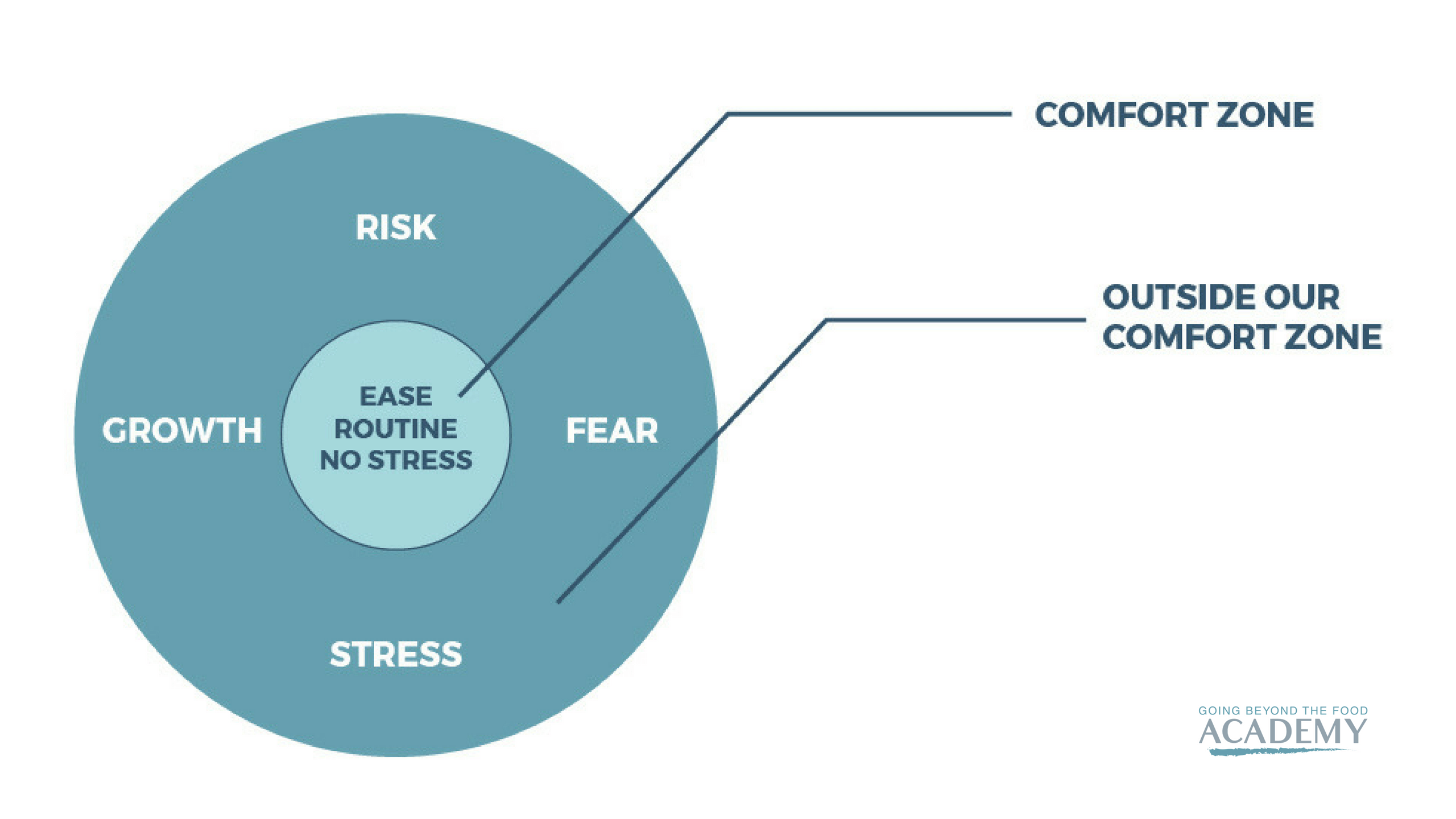
Just like all women… you and I self sabotage frequently 😀.
How many times have you set a goal feeling hopeful and optimistic about accomplishing it? You set up your game plan and you start taking action – for some, it means trying the latest diet, signing up for gym a membership, or setting your alarm to ring an hour earlier than usual to go for that morning run.
Then, all of a sudden, you find yourself doing things that block you from achieving your goals. Once again, you feel disappointed with yourself and frustrated that you cannot make those goals a reality. It feels like another failed attempt.
This isn’t you failing but is actually your self-sabotaging in action.
We are not always aware of our own self-sabotaging ways, which is the very reason why we don’t get the results we set for ourselves like changing our eating habits.
What Is Self-Sabotage?
Self-sabotage is a behavior that interferes with long-standing goals. It’s having the behaviors that create problems and are completely against what you are trying to achieve, but they still happen.
Many refer to it as standing in your own way and blocking yourself towards success. It can feel like having a conflicting internal dialogue or subconsciously doing things that are counterproductive to your goals. But why do we do it?

Why Do We Self-Sabotage?
It may be surprising to know, but self-sabotage is actually a method of self-protection. You might be thinking, “How is blocking yourself towards success be a method of self-protection?”
It is a survival mechanism to avoid risk, fear, and stress. And it’s the part of your brain telling you to avoid these things because we’re wired to think that gains are greater by staying put than going into the uncomfortable zone, which is our personal growth zone. Moreover, it’s our subconscious mind believing that we will have more pain if we succeed than if we fail.
Take a look at the illustration below. Notice that inside your comfort zone, you will find ease, routine, and no stress. This is where most of us stay for the most part of our lives. And just outside your comfort zone, there is risk fear, stress and growth, which are things that we normally or instinctively would like to avoid.
One important thing to remember is that achieving our goals only resides outside of our comfort zone. I want to help you step outside of your comfort zone so that you can achieve your goals.

Now that you know what self-sabotage is and the reason why you do it, the first step to overcome it is by understanding what your self-sabotaging behaviors are and start taking responsibility for them. Do you know your own self-sabotaging behaviors?
5 Common Self-Sabotage Behaviors
1. Perfection – This all-or-nothing attitude prevents you from taking action as you’re waiting for the right time or for the perfect environment or situation. It’s the “If I can’t do it 100%, I might as well not do it” mindset. This is one of the most common self-sabotaging behaviors among those who are trying to stop emotional eating and the reason why women fail to follow through with their goals of overcoming their food cravings.
2. Procrastination – When you procrastinate and wait to do something because it’s not the right timing or it’s not the right season.
3. Not Feeling Good Enough – This is often why we decide to do something and then why we punish ourselves through self-sabotage.
4. Expecting the worst – When you feel like you are not good enough, you automatically go to the place where you are not going to be successful. You actually are preparing yourself for failure by expecting yourself to fail.
5. Blaming responsibility – “I just don’t have the time to because I have kids, I need to cook for the family, I have to clean the house, I have work to do…”.
I know all of the above very well having gone through them through my 25 years of dieting. My number 1 excuse while I was a Corporate Executive was “I just don’t have time because I have a lot of important things to do.”
Through my experience, I’ve developed programs to help you understand what Emotional Eating is and how to take back your control of your power over food. You can review the programs we offer here.
Here are 3 quick tips to get you started on the path of understanding your own self-sabotaging behaviors:
How to Stop Self-Sabotage?
We are all different so we all have different patterns and behaviors of self-sabotage. The key to stop self-sabotage is understanding your own self-sabotaging behaviors.
1. Self-Awareness
The first step on the process of stopping self-sabotage is to identify and understand what your self-sabotaging behaviors are.
The key thing will be to ask yourself these questions: What is my behavior? What is driving it? What is behind it?
My most expressed form of self-sabotage is procrastination where I have a mile-long list of things to do, but I don’t feel like doing anything. I keep thinking of how much work is in front of me and I feel overwhelmed. My anxiety kicks in and I just can’t get started. I can’t even do one thing on my list!
What’s behind this self-sabotage behavior? FEAR. Fear of failure. Fear that I won’t be able to do it perfectly, so I might as well not do it at all.
When dieting, this fear translates into trying to follow a diet perfectly or feeling like a failure. Fear that if you don’t lose the weight, you won’t be happy. Fear that you’re not good enough.
You’re not alone – we’ve all been there.
Being on a very restrictive diet and attempting to be perfect may be a major trigger for you. Research has demonstrated that people who are on a DIET experience 50% more cravings than those not on a diet.
Now that you’re aware of your self-sabotaging behavior triggers, know that you are perfect as you are right now. You are enough. We all have imperfections and that is part of being a human! Knowing this is your first step towards accepting yourself and what you think are your imperfections.
2. Release Yourself from Your Self-Sabotage Triggers
The next step it to take action on the real root cause.
If the trigger is “I’ll just start tomorrow,” you must realize that you must adopt a lifestyle of how you want to live your life and NOT how you’re going to restrict yourself through a diet. A life that is too restrictive will lead you to cravings and emotional eating.
If perfectionism is at the root of the issue, remember this saying, “Less is more.” I recently implemented a “less is more” initiative in my life. I reduced how much I was doing so my list of to-do’s was not as long and overwhelming. Trying to be perfect is futile and exhausting.
Perfection is impossible to attain! Learning to release yourself from your triggers will allow you to make choices that are good for you, will respect your needs, and allow you to be kind to yourself. Consistency wins over perfection anytime!
3.Make Choices That Are Making You Feel Good
If you are choosing to do something because you know you have to, must do, or should do, but when you are doing it, you don’t feel good… this is a clue.
Your body could be giving you signals that this is not for you by self-sabotaging because you really don’t want to be doing it. Ask yourself: Do I enjoy doing this? Do I feel good when I’m doing it? Do I feel empowered when I’m in this environment?
You need to work through changes in a way that feel kinder to yourself to be able to let those self-sabotaging behaviours go away.
Better choice can be made intuitively. We have our innate body wisdom that will guide towards better choice for ourselves. If you self sabotaging behaviours show up with food I’d suggest to get started with our free Intuitive Eating Guide.
Ready to Stop Self-Sabotaging?
Right now, you might be thinking, “I don’t even know where to start.” That’s okay! Personal development skills and tools are not being taught in most places. I’ve developed the following programs to help you get started!
1. Subscribe to The Beyond the Food Show podcast to get a free weekly audio episode where you will feel empowered to take control on your life and live confidently through learning to trust and respect your innate body wisdom.
Can’t wait to meet you!


